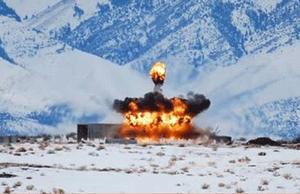In the trenchesTesting explosives capability helping armor research
In modern warfare, military vehicles use enormous armored panels to defend against weapons. Boosting protection by adding more steel, however, eventually makes equipment too heavy to use. There are other ways to defend against a weapon besides trying to stop it with just mass — smarter, more economic ways that are waiting to be discovered.

A testing explosion at the Idaho National Laboratory // Source: inl.gov
Far out in the eastern Idaho desert, four men crowd behind a half-buried bunker and wait. James Schondel, a burly man with a thick mustache, leans over what looks like a lunch box with a long white wire attached to it. He yells, “Fire in the hole!” before pressing a button on the box. The resulting “BOOM!” shakes the ground and feels like a pound to the chest even on the far side of the bunker. At INL, unique testing grounds and expertise align to combat contemporary national security challenges.
This is the team of Idaho national Laboratory (INL) explosives experts, materials scientists, and armor researchers who work in unique conditions amidst the sagebrush and tumbleweeds to study explosives and armor technology that could protect war fighters and enhance national security.
An INL release reports that today the researchers are using a new capability that could aid the design of stronger armor for U.S. troops. By seeing through smoke and fire, INL’s newly implemented flash X-ray system can reveal how a projectile or weapon interacts with armor at the exact moment of impact. This approach allows researchers to form a better understanding of the complex and high-speed interactions between weapons and armor.
This day of testing is dedicated to learning about the formation and flight of a specific weapon. “The reason we do this is because we have to calibrate a weapon, then we design the armor to counter it,” said Henry Chu, an armor specialist and the senior researcher at the site today. “[First] we’ve got to know what we are up against. We need to see through all the smoke and flashes to see what is going on.”
In modern warfare, military vehicles use enormous armored panels to defend against weapons. But boosting protection by adding more steel eventually makes equipment too heavy to use, said Jeff Lacy, an armor researcher who operates the flash X-ray system. There are other ways to defend against a weapon, he said, besides trying to stop it with just mass; smarter, more economic ways that are waiting to be discovered.
